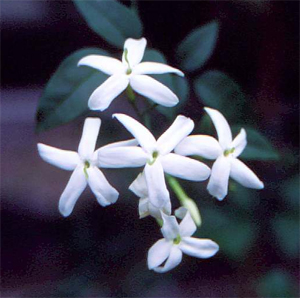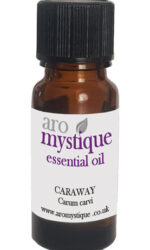Description
Details
 Plant/Part: Tree/Flowers (Source: India /Egypt)
Plant/Part: Tree/Flowers (Source: India /Egypt)
Latin Name: Jasminum Grandiflorum
Family: Oleaceae
Extraction: Enfleurage/Solvent Extraction
AROMA: Sweet, flowery and exotic- slightly heady.
PROPERTIES: Good for stress and general anxiety. Perfect skin care oil, excellent for hot, dry skin. Sensual properties and reputedly an Aphrodisiac! Only needs to be used in very small quantities. Exquisite perfume. A vast quantity of blossoms, which must be gathered at night when scent is at highest, are required to produce only a few drops of oil. Perhaps the most valued oil in childbirth. It hastens delivery by strengthening contractions yet relieving pain at the same time. A superb hormone balancer and effective in post-natal depression. It also relieves spasm in the uterus, soothes menstrual pain and helpful with vaginal infections generally. Jasmine is also a boon to the respiratory system. It helps to regulate and deepen breathing by relieving spasm of the bronchi as well as having a calming action on irritating coughs. Said to ease hoarseness as well. Reputedly loosens up stiff limbs too. Pure and undiluted. Emotionally warming. Relaxes, soothes, uplifts and helps self confidence. Good for stress and general anxiety. Perfect skin care oil, excellent for hot, dry skin.
CHEMICAL CONSTITUENTS: Jasmone, Benzyl acetate, Benzyl alcohol, Indol, Linalol, Linalyl acetate, Phenylacetic Acid, Methyl Jasmonate.
PRECAUTIONS: Not to be used in pregnancy until about to give birth – will then help to ease labour. Its overuse could disturb the bodily fluids especially phlegm and the ‘narcotic’ like properties may impede concentration. Certainly the powerful aroma indicates low dosage.
BLENDS: Blends well with all floral absolutes.
 USES:
USES:
Digestive: stimulates the production of gastric juices (carminative). “warms and strengthens a weak stomach” (tisserand)
Genito/Urinary: tones the uterus, used for dysmenorrhoea, uterine disorders. relieves cramps. aids in childbirth.
Respiratory: antispasmodic, antiseptic, helps to expel mucus, relieves coughing, used for catarrh, sore throat, laryngitis
Muscles/Joints: pain-relieving, anti-inflammatory, used for muscular spasm and sprains.
Skin/Hair: pain-relieving, anti-inflammatory, helps wounds and scars to heal; good for dry, sensitive skin, especially when there is redness or itching
Emotions/Mind: warming, sedative, soothing, uplifting, relaxing. used for anxiety, nervous exhaustion, depression and stress-related conditions. “produces afeeling of optimism, confidence and euphoria” (tisserand). v.a worwood recommends it for people who suffer from low self-esteem and feelings of guilt.
Other: increases the flow of milk.
Where Rose is often considered the ‘Queen of Oils’ Jasmine is regarded as the ‘King’. This may at first appear rather surprising, given the delicate appearance of the Jasmine flowers, which give an impression of feminity. But the oil extracted from them has a far more ‘masculine’ nature. It is dark in colour, viscous, and has a heavy, almost animal quality to the aroma, which is very long-lasting. Like Rose, Jasmine oil is very costly, because of the enormous quantity of flowers needed to produce a relatively small amount, and because it is extracted by the labour-intensive method of enfleurage. In the case of Jasmine, the labour costs are further increased by the need to gather the flowers at night, for the odour of Jasmine is more powerful after dark, due to changes in the plant’s internal chemistry. The flowers continue to release essential oil for several days after being picked, so are left on the cotton cloths soaked in olive oil until all possible oil has been extracted. The olive oil is afterwards extracted with spirits, leaving the true Jasmine essence. A cheaper grade of Jasmine oil is made by extracting directly from the petals with petroleum spirits. This does not produce the quality or intensity of odour, as the spirit kills the flower instantly, so that the maximum amount of essential oil is not extracted. This grade of Jasmine oil is of little use in aromatherapy, and ‘bargains’ in Jasmine oil will be avoided by caring therapists. As in the case of Rose oil, the initial cost is offset by the fact that the essence is so concentrated that very little is needed in treatment.
Also in common with Rose, the odour of Jasmine has never been satisfactorily synthesized. Synthetic Jasmine has a sickly sweetness that is nothing like true Jasmine oil, and can only be described as ‘cheap’ – which of course it is. It is interesting, though, that it does smell very like oil of Jasmine which has been left too long after mixing with a carrier oil and ‘gone off (i.e. been spoilt by the oxidisation of the carrier oil).
 Two varieties of Jasmine are used in making the essential oil: Jasminium officinalis and Jasminium grandiflorum, which is grown in great quantity around Grasse. The chemical constituents of the oil include methyl anthranilate, indol, benzyl alcohol, benzyl acetate, linalol and linalyl acetate. A number of other varieties of Jasmine are used in various countries around the world for their medicinal properties, but essential oils are not obtained from them. The properties of Jasmine overlap in some respects with those of Rose, being a valuable uterine tonic. It is valuable for menstrual pain and cramps (though there less costly oils, such as Marjoram, can be used just as effectively) and is very helpful in childbirth. If it is used as a massage oil on the abdomen and lower back in the early stages of labour, Jasmine will both relieve pain and strengthen contractions, and it helps with the expulsion of the placenta after delivery and aids post-natal recovery. Being also an antidepressant, it is a good oil to help relieve post-natal depression.
Two varieties of Jasmine are used in making the essential oil: Jasminium officinalis and Jasminium grandiflorum, which is grown in great quantity around Grasse. The chemical constituents of the oil include methyl anthranilate, indol, benzyl alcohol, benzyl acetate, linalol and linalyl acetate. A number of other varieties of Jasmine are used in various countries around the world for their medicinal properties, but essential oils are not obtained from them. The properties of Jasmine overlap in some respects with those of Rose, being a valuable uterine tonic. It is valuable for menstrual pain and cramps (though there less costly oils, such as Marjoram, can be used just as effectively) and is very helpful in childbirth. If it is used as a massage oil on the abdomen and lower back in the early stages of labour, Jasmine will both relieve pain and strengthen contractions, and it helps with the expulsion of the placenta after delivery and aids post-natal recovery. Being also an antidepressant, it is a good oil to help relieve post-natal depression.
Conversely, it is equally valuable in certain male disorders, such as enlargement of the prostate gland, and is said to strengthen the male sexual organs. It has had a reputation as an aphrodisiac since antiquity, and is one of the best means at our disposal to help with impotence and frigidity. An important fact to remember is that Jasmine, like all essential oils, acts on the mental and emotional levels as well as the physical. Since the majority of sexual problems arise from tension, anxiety, depression or fear, rather than from any physical cause, a relaxing, antidepressant oil such as Jasmine can be a real aid in relieving them, and it is doubtless in this way that Jasmine earned its aphrodisiac title.
As well as relaxing, Jasmine is often said to be ‘warming’. This can be confusing, for it is not a rubefacient like many of the warming oils (that is, it does not make the skin red by dilating the surface capillaries when used in massage) but it does have a gentle and deeply penetrating effect which makes it an ideal massage oil. Culpeper described it as being ‘good for hard and contracted limbs’. On the emotional plane, we find once again that the actions of this oil parallel its physical effects, for it is relaxing and emotionally ‘warming’. It is a powerful antidepressant of a stimulating nature, which makes it one of the best oils to help where depression has given rise to a certain lethargy. Jasmine is a good oil to choose for massage or baths for any person who lacks confidence, either in their own worth as a person, or their ability to overcome immediate problems.
the warming oils (that is, it does not make the skin red by dilating the surface capillaries when used in massage) but it does have a gentle and deeply penetrating effect which makes it an ideal massage oil. Culpeper described it as being ‘good for hard and contracted limbs’. On the emotional plane, we find once again that the actions of this oil parallel its physical effects, for it is relaxing and emotionally ‘warming’. It is a powerful antidepressant of a stimulating nature, which makes it one of the best oils to help where depression has given rise to a certain lethargy. Jasmine is a good oil to choose for massage or baths for any person who lacks confidence, either in their own worth as a person, or their ability to overcome immediate problems.
Jasmine is described as being a good remedy for coughs, (particularly catarrhal coughs), chest infections in general, and loss of voice; but I have to say that I have never used it for any of these purposes, because it is so costly, and there is a wide choice of other oils that are very effective for pulmonary problems. Jasmine is a beautiful oil to use in skincare, and enjoyed by almost anybody using it for the delicious perfume, though it is particularly good for skin that is hot, dry and sensitive. It needs to be used in tiny amounts, as too much can have an opposite effect to what is needed. However, the very strength of Jasmine’s perfuming power is usually enough to ensure that too much is not used.






Reviews
There are no reviews yet.